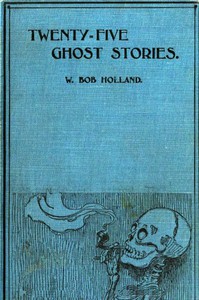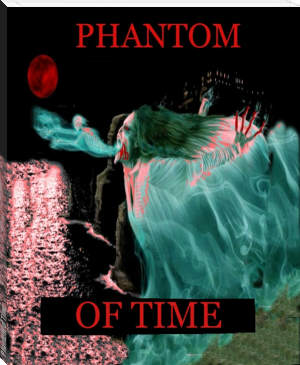Twenty-Five Ghost Stories, W. Bob Holland [ebook reader txt] 📗

- Author: W. Bob Holland
Book online «Twenty-Five Ghost Stories, W. Bob Holland [ebook reader txt] 📗». Author W. Bob Holland
“Really, it would not do to humor such fancies. So I touched the electric button, asked the porter{46} to bring me a table, and taking from my bag a pack of cards, proceeded to divert myself with a game of patience. I was puzzling where to put a seven of spades. ‘Where can it go?’ I murmured to myself. A voice behind me prompted: ‘Play the four of diamonds on the five, and you can do it.’ I started. The only occupants of the car, besides me, were a bridal couple, a mother with three little children, and a typical preacher of one of the straitest sects. Who had spoken? ‘Play up the four, madam,’ repeated this voice.
“I looked fearfully over my shoulder. At first I saw a bluish cloud, like cigar smoke, but inodorous. Then the vision cleared, and I saw a young man whom I knew by a subtle intuition to be the occupant, seen and not seen, of chair number thirteen. Evidently he was a traveling salesman—and a ghost. Of course, a drummer’s ghost sounds ridiculous—they’re so extremely alive! Or else you would expect a dead drummer to be particularly dead and not ‘walk.’ This was a most commonplace-looking ghost, cordial, pushing, businesslike. At the same time, his face had an expression of utter despair and horror which made him still more preposterous. Of course it is not nice to let a stranger speak to one, even on so impersonal a topic as a four of diamonds. But a ghost—there can’t be any rule of etiquette about talking with a ghost! My dear, it was dreadful! That forward creature showed{47} me how to play all the cards, and then begged me to lay them out again, in order that he might give me some clever points. I was too much amazed and disturbed to speak. I could only place the cards at his suggestion. This I did so as not to appear to be listening to the empty air, and be supposed to be a crazy woman. Presently the ghost spoke again, and told me his story.
“‘Madam,’ he said, ‘I have been riding back and forth on this car ever since February 22, 189—. Seven months and eleven days. All this time I have not exchanged a word with anyone. For a drummer, that is pretty hard, you may believe! You know the story of the Flying Dutchman? Well, that is very nearly my case. A curse is upon me and will not be removed until some kind soul——. But I’m getting ahead of my text. That day there were four of us, traveling for different houses. One of the boys was in wool, one in baking powder, one in boots and shoes, and myself in cotton goods. We met on the road, took seats together and fell into talking shop.
“‘Those fellows told big lies about their sales, Washington’s Birthday though it was. The baking powder man raised the amount of the bills of goods which he had sold better than a whole can of his stuff could have done. I admitted the straight truth, that I had not yet been able to make a sale. And then I swore—not in a light-minded,{48} chipper style of verbal trimmings, but a great, round, heaven-defying oath—that I would sell a case of blue denims on that trip if it took me forever. We became dry with talk, and when the train stopped at Rivermouth, we went out to have some beer. It is good there, you know—pardon me, I forgot that I was speaking to a lady. Well, we had to run to get aboard. I missed my footing, fell under the wheels, and the next thing that I knew they were holding an inquest over my remains; while I, disemboweled, was sitting on a corner of the undertaker’s table, wondering which of the coroner’s jury was likely to want a case of blue denims.
“‘Then I remembered my wicked oath, and understood that I was a soul doomed to wander until I could succeed in selling that bill of goods. I spoke once or twice, offering the denims under value, but nobody noticed me. Verdict: accidental death; negligence of deceased; railroad corporation not to blame; deceased got out for beer at his own risk. The other drummers took charge of the remains, and wrote a beautiful letter to my relatives about my social qualities and my impressive conversation. I wish it had been less impressive that time! I might have lied about my sales, or I might have said that I hoped for better luck. But after that oath there was nothing for it. Back and forth, back and forth, on this road, in chair number{49} thirteen, to all eternity. Nobody suspects my presence. They sit on my knees—I’m playing in luck when it is a nice baby as it was this afternoon! They pile wraps, bags, even railway literature on me. They play cards under my nose—and what duffers some of them are! You, madam, are the first person who has perceived me; and therefore I ventured to speak to you, meaning no offense. I can see that you are sorry for me. Now, if you recall the story of the Flying Dutchman, he was saved by the charity of a good woman. In fact, Senta married him. Now I’m not asking anything of that size. I see that you wear a wedding ring, and no doubt you make some man’s happiness. I wasn’t a marrying man myself, and, naturally, am not a marrying ghost. And that has nothing to do with the matter anyway. But if you could—I don’t suppose you would have any use for them—but if you were disposed to do a turn of good, solid, Christian charity—I should be everlastingly grateful, and you may have that case of denims at $72.50. And that quality is quoted to-day at $80. Does it go, madam?’
“The speech of the poor ghost was not very eloquent, but his eyes had an intense, eager glare, which was terrible. Something—pity, fear, I do not know what—compelled me. I decided to do without that white and gold evening cloak. Instead, I gave $72.50 to the ghost and took from{50} him a receipt for the sum, signed J. Billington Price. Then he smiled contentedly, thanked me with emotion, and returned to chair number thirteen. Several times on the journey, although I did not perceive him again, I felt dazed. When the train arrived at New York, and I, with the other passengers, dismounted, it seemed to me that a strong hand passed under my elbow, steadying me down the steps. As I walked the length of the station my bag—not heavy at any time—appeared to become weightless. I believe that the parlor-car ghost walked beside me, carrying the bag, whose handle still remained in my other hand. Indeed, once or twice I thought I felt the touch of cold fingers against mine. Since then I have no reason to suppose that the poor ghost is not at rest. I hope he is.
“But I never expected nor wished for the blue denims. The next day, however, a dray belonging to a great wholesale house backed up to our door and delivered a case of denims, with a receipted bill for the same. What was I to do? I could not go about selling blue denims; I could not give them away without exciting comment. So I furnished the cottage with them—and you know the effect on my complexion. Pity me, dear! And credit me, frivolous woman as I am, with having saved a soul at the expense of my own vanity. My story is told. What do you think about it?”{51}
GHOST OF BUCKSTOWN INN.BY ARNOLD M. ANDERSON.
Several travel-worn drummers sat in the lobby exchanging yarns. It was Rodney Green’s turn, and he looked wise and began his tale.
“I don’t claim, by any means, that the belief in ghosts is a general thing in Arkansas, but I do say that I had an experience out there a few years ago.
“It was late in the fall, and I happened to be in the village of Buckstown, which desecrates a very limited portion of the State. The town is about as small and dirty a place as ever I saw, and the Buckstown Inn is not much above the general character of the place. The region is inhabited by natives who still cling to all sorts of foolish superstitions. The inn, in the ante-bellum days, was kept by one who was said to be the meanest and most crabbed of mortals. The old demon was as miserly as he was mean, and all his narrow life he hoarded his filthy lucre with fiendish greed. Report had it also that he had even murdered his patrons in their beds for their{52} money. What the facts actually were I don’t know, but even to this day the old inn is held in suspicion. A lingering effect of former horrors still clouds its memory.
“The present proprietor, Bunk Watson—his real name is Bunker, I believe—is an altogether different sort of chap—a Southern type, in fact—one of those shiftless, heedless, happy-go-lucky mortals who loves strong whiskey and who chews an enormous quid of black tobacco and smokes a corncob pipe at the same time.
“When the former keeper ‘shuffled off,’ his property fell to a distant relative, the present keeper, who, with his family, immediately moved in from a neighboring hamlet and took possession. It was well known that the old proprietor had accumulated considerable wealth during his sojourn among the living, but all efforts to discover any treasure upon the premises had failed, and now the idea of ever finding it was practically given up. As far as Bunk was concerned, the matter troubled him little. He had a hard-working wife who ran things the best she could under the circumstances, and saw that his meals were forthcoming at their respective intervals. What more could he wish? Why should he care if there was a treasure buried upon his place? Indeed, it would have been a sore puzzle for him to know what to do with a fortune unless perhaps his wife came to his aid.{53}
“Among the stories that hovered in the history of the Buckstown Inn was one which involved a ghost. In the room where the former keeper had died peculiar noises were heard at unearthly hours: sighing, moaning, and, in fact, all the other indications which point to the existence of ghosts, were said to be present. On account of this the chamber had long since been abandoned.
“I listened with keen interest to the wonderful tales about the haunted room, and then suddenly resolved to investigate—to sleep in that chamber that very night and see for myself all that was to be seen. I told Buck of my purpose. He shook his head, shrugged his shoulders, but instead of warning me and offering a flood of protests, as I expected, he merely took his pipe from his mouth, let fly a quart or so of yellowish juice from between a pair of brown-stained lips, and, opening one corner of his wide mouth, lazily called out: ‘Jane.’ His wife appeared, and he intimated that I should settle the matter with the ‘old woman.’ The prospect of a fee persuaded the wife, and off she went to arrange for my bed in that ill-fated room.
“At nine o’clock that evening I bid the family good-night, took my candle, ascended the rickety stairs and entered the chamber of horrors. The atmosphere was heavy and had a peculiar odor that was not at all pleasing. However, I latched the door and





Comments (0)